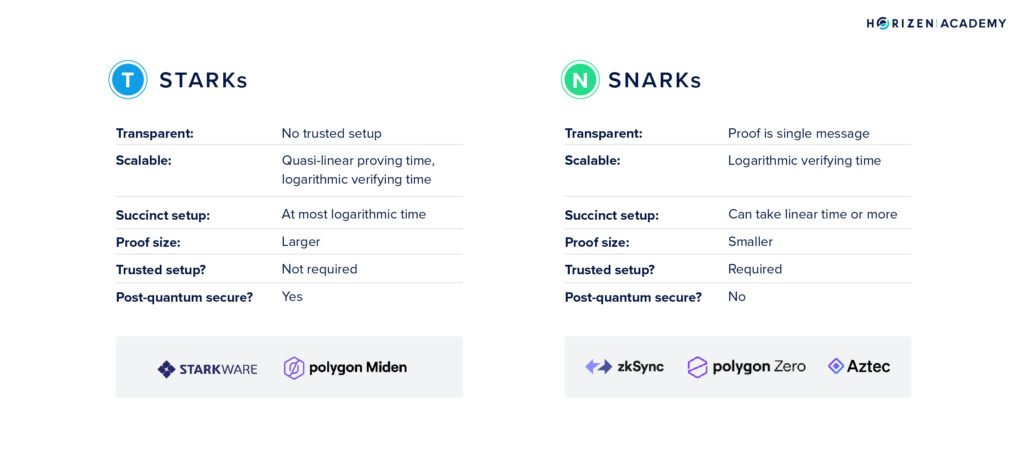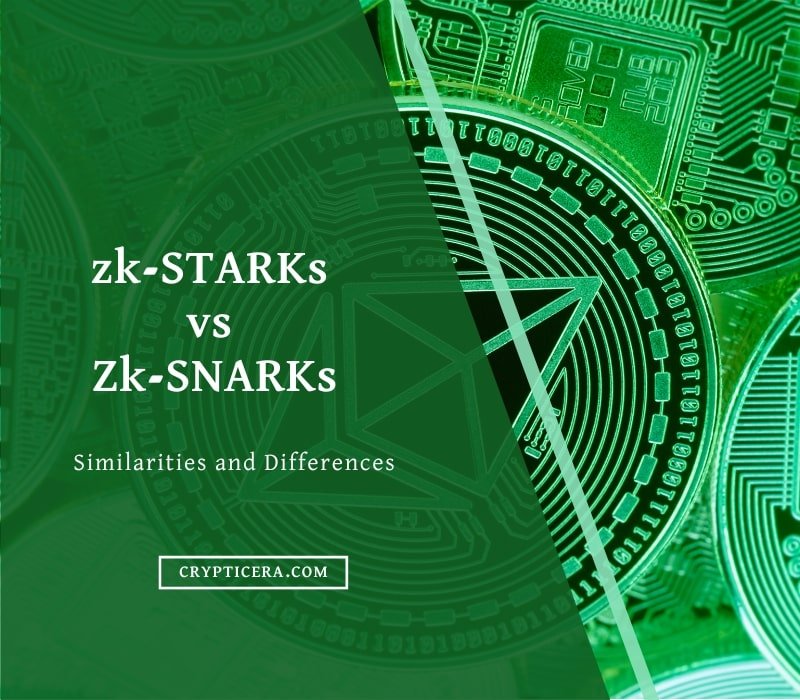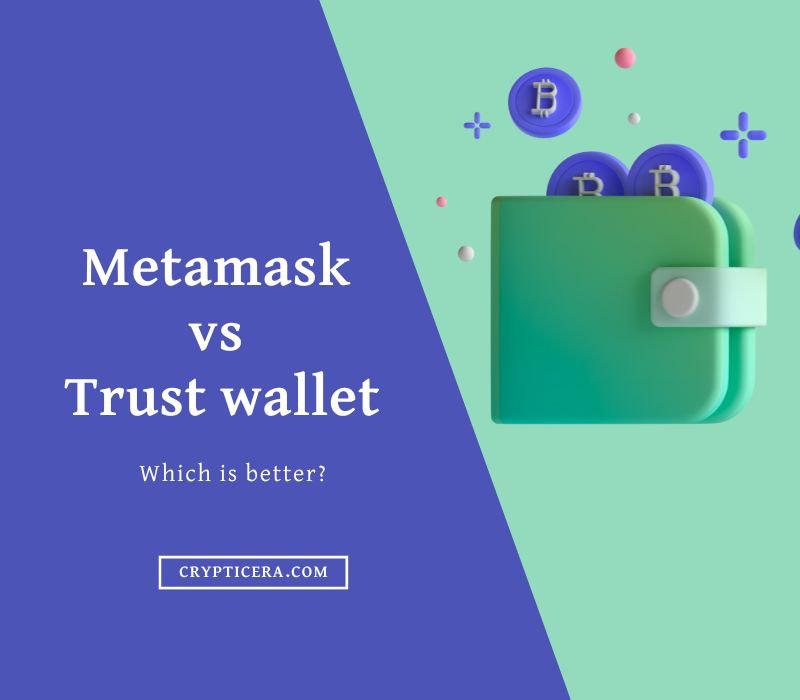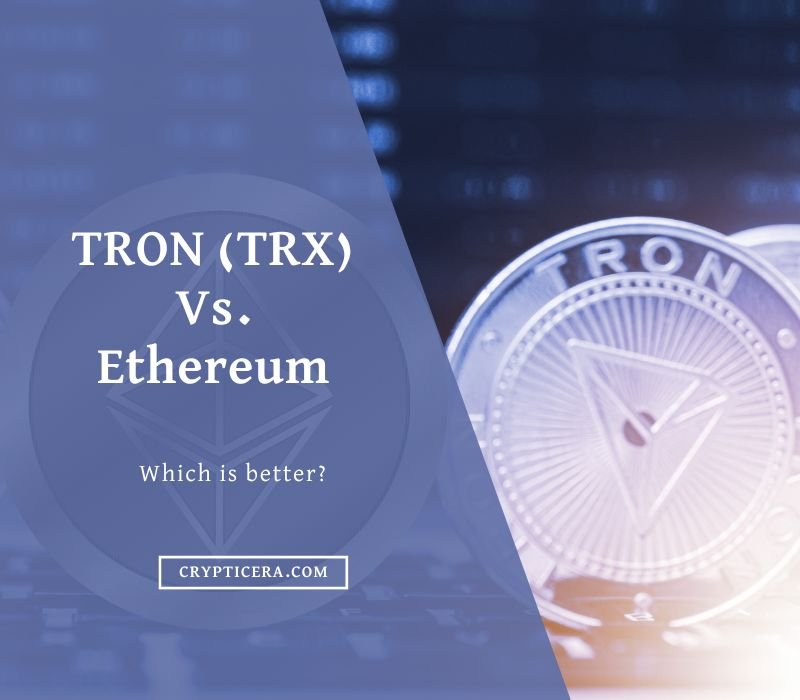Zero-knowledge technologies have taken the blockchain world by storm, providing a new level of privacy and security for online transactions.
Two of the most popular zero-knowledge proofs are zk-STARKs and zk-SNARKs. But what exactly sets these two apart and which one is better?
zk-STARKs are post-quantum secure and have faster verification times, while zk-SNARKs have smaller proof sizes and are more widely used in current blockchain applications.
In this blog post, we’ll dive into the differences between “zk-STARKs vs zk-SNARKs” and explore their respective benefits and drawbacks. From scalability to computational efficiency, we’ll cover everything you need to know.
zk-STARKs vs zk-SNARKs: Similarities and Differences
| Feature | zk-STARKs | zk-SNARKs |
|---|---|---|
| Definition | Zero-Knowledge Succinct Transparent Argument of Knowledge | Zero-Knowledge Succinct Non-Interactive Argument of Knowledge |
| Proof Size | Larger than zk-SNARKs | Smaller than zk-STARKs |
| Complexity | Higher | Lower |
| Verifiability | Publicly Verifiable | Not Publicly Verifiable |
| Trust Model | No Trusted Setup Required | Trusted Setup Required |
| Speed | Faster than zk-SNARKs | Slower than zk-STARKs |
| Security | Provably secure | Less secure than zk-STARKs |
zk-STARKs and zk-SNARKs are two privacy-enhancing technologies used in blockchain systems to enable secure and private transactions. The main difference between the two is the proof size and verifiability.
zk-STARKs have larger proof sizes than zk-SNARKs but are publicly verifiable, meaning that anyone can verify the proof without needing to trust any specific party. zk-SNARKs have smaller proof sizes but are not publicly verifiable and require a trusted setup.
In terms of complexity, zk-STARKs are more complex than zk-SNARKs, but zk-STARKs are also faster and more secure. zk-SNARKs are slower but have lower complexity and do not require a trusted setup.
zk-STARKs have several advantages over zk-SNARKs, but they are still relatively new technology and are not yet widely adopted in the blockchain space.
Zero-Knowledge Proofs (ZK-Proofs)
zero-knowledge proofs play a crucial role in ensuring the privacy and security of transactions. All transactions in a blockchain network are publicly visible, which can raise privacy concerns for certain types of transactions, such as financial transactions or medical records.
ZK-proofs provide a solution to this problem by enabling users to prove that a transaction is valid without revealing any confidential information. For example, a user can prove they have the right to access a specific set of medical records without revealing the actual contents of the records.
This is achieved through the creation of a zero-knowledge proof that certifies the validity of the transaction, without revealing any additional information. Ethereum has implemented zero-knowledge proofs through the use of privacy-focused layer 2 solutions, such as zk-rollups, zk-STARKs, and zk-SNARKs.
These solutions enable users to perform private transactions on the Ethereum network without revealing the contents of the transaction to the public. By using zero-knowledge proofs, Ethereum can ensure that private transactions are secure, and verifiable, while still maintaining the transparency and decentralization of the blockchain.
What are zk-STARKs?
zk-STARKs (Zero-Knowledge Succinct Transparent ARgument of Knowledge) are a type of proof construction that provides zero-knowledge proofs for computational integrity. They enable the verification of computations without revealing any information about the inputs.
Zk-STARKs were introduced by Uri Kolodny and Gustav Simonsson in 2018.
In the context of Ethereum, zk-STARKs can be used to increase privacy and scalability in the network by allowing for off-chain computation while still ensuring the same level of security and transparency as on-chain computations. This is accomplished by creating proof that the computation was performed correctly, without revealing the inputs or the computation itself.
Unique features of zk-STARKs are:
- Zero-knowledge: The proof does not reveal any information about the inputs or the computation, only that it was performed correctly.
- Succinct: The size of the proof is small compared to the size of the computation being verified.
- Transparent: The proof can be verified by anyone, without the need for a trusted setup.
- ARgument of Knowledge: The proof provides strong mathematical guarantees about the correctness of the computation.
These features make zk-STARKs an attractive solution for privacy-sensitive applications and for scalability in blockchain networks.
What are zk-SNARKs?
zk-SNARKs (Zero-Knowledge Succinct Non-Interactive Argument of Knowledge) is a privacy-enhancing technology used in blockchain systems, particularly in Ethereum, to enable secure, privacy-preserving transactions.
Zk-SNARKs were first introduced in a paper by researchers Eli Ben-Sasson, Alessandro Chiesa, Christina Garman, Matthew Green, Ian Miers, Eran Tromer, and Madars Virza in 2012.
They are used to provide privacy for transactions on the Ethereum blockchain. The technology enables users to prove that they have the required funds to execute a transaction without revealing the specific amount of funds or the identity of the sender. This enhances the privacy and security of transactions on the Ethereum blockchain.
The zk-SNARKs proof construction consists of three algorithms: a setup algorithm, a proving algorithm, and a verification algorithm. The setup algorithm is run once, at the beginning of the life of the blockchain, and generates a public/private key pair.
The proving algorithm is run by the prover, who inputs a statement and generates a proof, which is then verified by the verifier using the verification algorithm.
Unique Features of zk-SNARKs:
- Zero-knowledge: The most significant feature of zk-SNARKs is that they allow for zero-knowledge proofs, meaning that no information is disclosed about the statement being proven.
- Succinctness: zk-SNARKs are “succinct” because the proof size is small, typically less than a kilobyte, which makes them more efficient for use in a blockchain.
- Non-Interactivity: zk-SNARKs are “non-interactive” because the proof can be verified without any interaction between the prover and the verifier.
- Argument of Knowledge: zk-SNARKs provide an “argument of knowledge,” meaning that the proof provides strong evidence that the statement being proven is true.
- Privacy and Security: zk-SNARKs enhance the privacy and security of transactions on the Ethereum blockchain by enabling secure, private transactions without revealing any sensitive information.
zk-STARKs vs zk-SNARKs: Which is Better For Layer-2 Ethereum Scalability?

Both zk-STARKs and zk-SNARKs are zero-knowledge-proof systems that can be used for Layer-2 scalability on the Ethereum network. They have different trade-offs in terms of efficiency, security, and ease of implementation.
zk-SNARKs have been widely used in various applications, such as privacy-preserving transactions, and have been proven to be efficient and secure. However, they require a trusted setup process and have a relatively large proof size compared to zk-STARKs.
zk-STARKs, on the other hand, have the advantage of being post-quantum secure, having a smaller proof size, and not requiring a trusted setup. However, they are relatively new and their security proof is still being actively researched.
In terms of scalability for Layer-2 on Ethereum, both zk-STARKs and zk-SNARKs have the potential to provide significant benefits. But the choice between the two may depend on the specific requirements and trade-offs of each use case.
Scalability and Verifiability
When comparing zk-STARKs and zk-SNARKs, scalability is a crucial aspect to take into account. Here is how they differ in terms of scalability:
zk-STARKs:
- Scalability: One of the major benefits of zk-STARKs is their scalability potential. The proof size of zk-STARKs is fixed, meaning it remains constant regardless of the size of the data being proven. This makes it more feasible to scale the technology as the network expands.
- Verifiability: zk-STARKs are publicly verifiable, meaning anyone can verify the proof without relying on a particular entity. This enhances scalability as the proof verification process can accommodate growth in user numbers, as the burden of verification is not concentrated among a few parties.
zk-SNARKs:
- Scalability: zk-SNARKs also offer some scalability benefits. For instance, their proof size is very compact, making it convenient to store the proofs on-chain, allowing the technology to scale as the number of transactions increases.
- Verifiability: Unlike zk-STARKs, zk-SNARKs are not publicly verifiable, meaning that the responsibility of proof verification falls on a few parties. This could pose a challenge in scaling the verification process as the number of users grows, as the parties responsible for verification may become overwhelmed.
Privacy and Security
Zk-STARKs are more transparent in comparison to zk-SNARKs as the entire verification process can be publicly audited, which makes it easier to identify any potential security weaknesses.
On the other hand, in the setup phase of a zk-SNARK, a trusted setup is necessary. A group of participants must generate a public and private key pair, which is used to generate the proof. If this setup is breached, the entire system can be compromised. In contrast, zk-STARKs do not require a trusted setup, making them more secure.
Zk-SNARKs have smaller proof sizes, making them more practical for real-world applications and efficient. However, the smaller proof size of zk-SNARKs makes them more susceptible to quantum computing attacks. Zk-STARKs have larger proof sizes, but they are quantum-resistant.
In terms of succinctness, zk-SNARKs are more succinct, meaning that the size of the proof is proportional to the statement being proven, making them more efficient. On the other hand, zk-STARKs are less succinct but still provide a high level of security.
Examples of zk-Rollup Crypto projects
1. Polygon (MATIC)
Polygon is a Layer 2 scaling solution for Ethereum. It utilizes a variety of scaling techniques, including zk-rollups, to allow for faster and cheaper transactions on the Ethereum network. Polygon also has its own governance model, which allows community members to vote on and implement upgrades to the network.
2. ImmutableX (IMX)
Immutable X is a non-fungible token (NFT) platform built on the Ethereum network. It uses zk-rollups to provide fast and secure trading of NFTs, while also offering low minting fees for creators. Immutable X aims to provide a user-friendly platform for buying, selling, and discovering NFTs, with a focus on speed and security.
3. zkSync
zkSync is a Layer 2 scaling solution for Ethereum, built on top of zero-knowledge proofs. It allows for fast and secure transactions on the Ethereum network, while also providing support for smart contracts and decentralized applications. zkSync uses a combination of rollups and zero-knowledge proofs to ensure that transactions are both fast and secure, making it a highly scalable solution for Ethereum.
Must Read: Top 5 ZK-Rollup Projects in Crypto
What are the applications of zk-SNARKs?
zk-SNARKs have several potential applications:
- Privacy-Preserving Transactions: They can be used to verify transactions on a blockchain without revealing the underlying details.
- Digital Identity Verification: zk-SNARKs can be used to verify identity without revealing personal information.
- Supply Chain Management: They can be used to track goods through a supply chain while preserving the privacy of the participants.
- E-Voting: They can be used to provide a secure and transparent voting system.
- Compliance and Auditing: They can be used to prove compliance with regulations or auditing processes without revealing sensitive information.
What are the applications of zk-STARKs?
zk-STARKs are a recent development in the field of zero-knowledge proofs and have several potential applications, some of which include:
- Decentralized Exchange: They can be used to perform trustless trades of cryptocurrencies without revealing the underlying details.
- Privacy-Preserving Machine Learning: zk-STARKs can be used to protect sensitive data during the training process of machine learning models.
- Scalable and Efficient Verification: zk-STARKs offer faster verification times and can be executed with limited computational resources, making them well-suited for use in IoT devices and other resource-constrained environments.
Conclusion
In conclusion, Zk-STARKs and Zk-SNARKs are both important technologies for privacy and security in blockchain systems, but they differ in several ways. Zk-STARKs offer the advantage of being more transparent and secure but are slower and more computationally intensive than Zk-SNARKs.
On the other hand, Zk-SNARKs are faster and more efficient, but also come with some limitations in terms of privacy and security.
Regardless, both technologies are helping to advance the field of privacy and security in blockchain and show great promise for the future.



